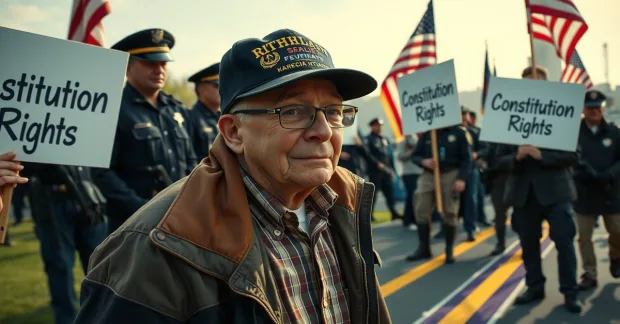
Many public officials have become all too comfortable in straying away from their constitutional oaths, jeopardizing the rights of Citizens in local municipalities. The erosion of these solemn pledges not only undermines the very fabric of this great Republic, but also poses a dangerous threat to civil and human rights. The power dynamic between public officials and the Citizenry hinges on the latter’s awareness of their authority over those who are nothing less than public servants. It is crucial to recognize that the ultimate authority always remains with the people, the Citizens.
Key Takeaways:
- Comfort in Violating Oaths: Some public officials have grown comfortable in violating their oaths of office, leading to concerns about their commitment to constitutional principles.
- Ignorance of Citizenry: The erosion of constitutional oaths is exacerbated by the lack of awareness among Citizens about their authority over public officials, who are meant to serve the people.
- Civil Rights/Human Rights: Violations of constitutional oaths by public officials can directly impact the civil rights and human rights of Citizens, highlighting the importance of upholding these oaths.
- Empowering the Citizens: The power always remains with the people, the Citizens, and it is crucial for them to be informed and engaged in holding public officials accountable for their actions.
- Accountability: Strengthening mechanisms for holding public officials accountable for breaching their oaths is imperative to maintaining the integrity of a Republican form of government.
- Educational Reform: Enhancing civic education to instill a deeper understanding of constitutional obligations can help prevent future violations of oaths by public officials.
- Ethical Leadership: Promoting ethical leadership and emphasizing the importance of upholding constitutional principles in public service can contribute to a more transparent and trustworthy governance system.
The Sanctity of Oaths in Local Municipalities
It is fascinating to observe the historical significance of sworn promises within the context of local municipalities. Since the very first published United States congressional record, these oaths have served as foundational elements in binding public officials to the principles outlined in their respective constitutions.
Historical Significance of Sworn Promises
On the tapestry of American governance, the oath-taking ritual holds a unique position. It is a symbolic act that signifies a public official’s commitment to upholding the values and principles enshrined in the constitution of their municipality. Throughout history, these oaths have been revered as solemn vows, embodying the essence of civic duty and responsibility.
The Civic Sacrament: Oath of Office Across Localities
One of the most intriguing aspects of the oath of office in local municipalities is its universal application across different levels of government. Whether at the city council, county board, or town hall, public officials take this sacred vow to protect and serve their constituents. For instance, in a small town like Rosewood, Mayor Smith’s oath to uphold the city charter carries the same weight as the Governor’s pledge to defend the state constitution.
In many cases, public officials in local municipalities have become comfortable with violating their oaths of office and encroaching on the civil rights/human rights of the Citizens. This disturbing trend is often fueled by the ignorance of the Citizenry regarding their authority over public officials, who are nothing more than public servants. It is crucial to remember that the power always resides with the people, the Citizens, and holding public officials accountable is vital to maintaining a healthy Republican form of government as guaranteed to the people by the American Constitution to which all public officials/public servant affirm or swear to uphold..
The Subtext of Sworn Statements: Public Perception
Many public officials take their oaths of office with a sense of solemnity, yet the echoes of authenticity often ring hollow in the ears of the public.
Public Trust and the Echo of Authenticity
The perception of public officials violating their constitutional oaths has eroded the trust of the citizenry in the very fabric of a Republican form of government. The disconnect between sworn promises and actual actions has created a disillusionment that reverberates throughout local municipalities.
When Vows and Values Collide: Navigating Public Expectations
Values and principles are the guiding lights that shape the decisions and actions of public officials. For instance, when an official disregards the constitutional rights of Citizens in pursuit of personal or political gain, the repercussions are far-reaching.
It is imperative that Citizens understand their authority over their public officials, who are nothing more than public servants.
The power dynamics between the governed and the governing play a crucial role in maintaining a healthy Republic. Public officials have become comfortable in violating their oaths of office and interfering with the civil rights/human rights of the Citizens due to the Citizenry’s ignorance of their own authority and the responsibilities of those in power.
The power always remains with the people, the Citizens.
Of Promises and Pragmatism: Bridging Administrative Ambitions
All too often, public officials walk a fine line between their promises to uphold the constitution and the pragmatic realities of governance. In local municipalities across the United States, this delicate balancing act has come under scrutiny as leaders navigate the complexities of progressive policy-making while staying true to their oath of office.
The Tightrope of Progressive Policy-Making
Pragmatism dictates that public officials must weigh the demands of their constituents against the legal and ethical boundaries set by their constitutional oaths. However, in the pursuit of advancing progressive agendas, some officials may find themselves straying into murky waters where the allure of political expediency threatens to overshadow their solemn commitments.
At the Altar of Ambiguity: Interpretations and Intent
Promises made during election campaigns often collide with the ambiguous terrain of governance, where interpretations of policy decisions vary widely. In this realm of uncertainty, public officials may justify their actions by citing the need for flexibility or creative problem-solving, blurring the lines between faithful adherence to their oaths and the pursuit of broader administrative ambitions.
Altar: It is crucial for Citizens to remain vigilant and informed about their rights and the authority they hold over their elected officials. As public servants, officials are accountable to the people, and any erosion of constitutional oaths or interference with civil rights must be met with active Citizenry demanding transparency and accountability.
Instances of Oath Violations: The Slippery Slopes of Local Power
Controversial Executive Actions Below the Beltway
For one, the allure of power can sometimes lead local officials to overstep their constitutional bounds, resorting to controversial executive actions that test the limits of their authority. These actions, often justified under the guise of expediency or public interest, can set a dangerous precedent where the rule of law becomes a mere suggestion rather than a steadfast principle.
Legislative Maneuvering and the Ghosts of Governance
Good intentions can quickly turn sour when legislative maneuvering takes center stage in local municipalities. Instances where lawmakers bend or break procedural rules to push through contentious measures highlight the delicate dance between governance and ethical conduct. Despite being entrusted with the public good, some officials seem to forget that their power is derived from the very Citizens they are meant to serve.
In many cases, legislative maneuvering operates in the shadows, away from the scrutiny of an informed Citizenry. Without an engaged populace holding their representatives accountable, the ghosts of governance can haunt the halls of local government, perpetuating a cycle of unchecked power and eroding the trust of those they are duty-bound to serve.
Judicial Dilemmas and the Scales of Injustice
Instances where legislators and executives clash with the judiciary present yet another challenge to the sanctity of constitutional oaths in local municipalities. The scales of injustice tip precariously when judges’ decisions are perceived as influenced by political agendas rather than impartial interpretation of the law. The erosion of public trust in the judiciary, a cornerstone of just governance, underscores the pressing need for ethical leadership at all levels of government.
Legislators may craft laws that intersect with constitutional boundaries, testing the resolve of the judicial system to uphold the rights and freedoms of the populace. When the checks and balances of constitutional law falters, it is the duty of the people to reclaim their power and demand accountability from those who have sworn to protect and defend their interests.
Cracks in the Civic Foundation: Root Causes of Oath Violations
Political Polarization and the Fractured Fidelities
The erosion of constitutional oaths in local municipalities often stems from the deepening divisions of political polarization. As public officials become entrenched in partisan battles, their allegiance to constitutional principles may waver, leading to compromises in upholding their sworn duties. The lines between party loyalty and constitutional fidelity blur, creating a breeding ground for oath violations.
Erosion of Civic Education: The Forgotten Foundations
Polarization of the political landscape has contributed to the neglect of civic education, a cornerstone for understanding the importance of constitutional oaths. As public officials and Citizens alike grapple with the complexities of governance, a lack of civic knowledge can pave the way for ignorance regarding constitutional obligations. Without a solid foundation in civic education, the enforcement of constitutional can weaken, leaving room for oath violations and mob rule (DEMOCRACY) to take root.
Foundations of civic education must be reinforced to empower both public officials and Citizens with the necessary knowledge to uphold constitutional principles. By fostering a deeper understanding of the significance of constitutional oaths, municipalities can work towards fortifying the civic foundation and mitigating the risks of oath violations.
Ethical Dilemmas in the Municipal Arena
Causes of oath violations in local municipalities often intersect with ethical dilemmas faced by public officials. Balancing personal beliefs, party allegiances, and constitutional duties can present challenges that test the moral compass of those in positions of power. The complexities of ethical decision-making in the municipal arena underscore the need for a steadfast commitment to upholding constitutional principles, even in the face of competing interests.
Root of the issue lies in navigating these ethical dilemmas with integrity, ensuring that public officials prioritize the well-being and rights of the Citizens they serve above all else. When faced with moral quandaries, adherence to constitutional oaths must remain unwavering, underscoring the fundamental importance of ethical leadership in local governance.
Bearing Witness to Betrayal: Consequences of Oath Violations
Erosion of Public Trust: The Domino Effect
Dominoes may seem like just a game, but in politics, one falling tile can lead to a cascade of consequences. When public officials, entrusted with upholding constitutional oaths, veer off course, the ripple effects are profound. The erosion of public trust is perhaps the most insidious outcome. As officials prioritize personal agendas over constitutional fidelity, Citizens lose faith in the very institutions designed to protect their rights and freedoms. This loss of trust creates a breeding ground for apathy, disillusionment, and a sense of powerlessness among the populace.
Legal Ramifications: When the Gavel Speaks
Hope can often be found in the halls of justice, where the gavel holds the power to mete out consequences for oath violations. However, the legal ramifications for public officials who betray their oaths may not always be swift or severe. The gavel’s judgment is dependent on a complex legal system that may not always prioritize accountability for constitutional breaches. While some cases may result in disciplinary actions or removal from office, others may go unpunished, leaving Citizens questioning the true extent of justice in a system where oaths are treated as mere formalities.
Safeguarding the Sanctuary: Constitutional Oaths and Their Protection
Strengthening Civic Education: Rebuilding the Ramparts
Their allegiances pledged in oaths, public officials have strayed from their sacred duties, undermining the very fabric of this great Republic. A key aspect lies in the vigor of civic education, empowering Citizens with the awareness and knowledge to hold their elected representatives accountable. By rebuilding the ramparts of civic education, we can equip the populace with the tools to discern genuine commitment from mere lip service, restoring the sanctity of constitutional oaths.
Accountability Measures: The Guardians of the Oath
Rebuilding trust in the system necessitates robust accountability measures to ensure that public officials uphold their solemn promises. The Accountability mechanisms must be fortified to deter and penalize deviations from constitutional fidelity. As instances of oath violations continue to erode the public’s trust, establishing clearer guidelines and consequences becomes paramount in safeguarding the integrity of constitutional oaths.
Another critical aspect of accountability is empowering Citizens to actively engage in the oversight of their elected officials. With a strong emphasis on transparency, Citizens can demand ethical behavior from their leaders, reinforcing the notion that public service is a noble responsibility, not a vehicle for personal gain.
Encouraging Ethical Leadership: The North Star of Public Service
Kevlar of ethical leadership must cloak public officials, shielding them from the temptations of power and corruption that may lead to oath violations. Upholding constitutional principles with unwavering moral courage is vital in restoring public trust and rejuvenating the de jure, constitutional ethos. Another aspect to consider is fostering a culture of ethical decision-making within governmental institutions, where integrity and accountability are valued above all else.
Looking Through the Lens: Perspectives and Prognosis
Once again, we find ourselves peering through the intricate lens of public officials and their constitutional oaths, a lens that seems to have fogged up with the comfortable disregard some officials have shown towards their solemn promises. As the erosion of constitutional oaths dastardly continues, it becomes imperative to probe deeper into the perspectives that have allowed such violations to persist.
Future Forecasts: Predicting the Preservation of Promises
Perspectives: The future of constitutional oaths in local municipalities hangs in the balance, with the preservation of these promises depending on a crucial factor – the awareness and vigilance of the Citizenry. As public officials grow comfortable in their violations, it is crucial for the people to recognize their power as the ultimate decision-makers. Only through an informed and engaged Citizenry can the tide be turned, and the integrity of constitutional oaths be upheld.
Balancing Acts: Weighing Words against the Winds of Change
Words: The delicate balance between public officials’ words and actions has reached a tipping point, where the promises made in oaths seem to falter against the winds of change. With the civil rights and human rights of Citizens at stake, it is imperative to scrutinize the actions of those entrusted with upholding the law. The interplay between promises and actions must be carefully weighed, with the power always remaining in the hands of the people.
Summing Up
So, it seems like public officials in local municipalities have gotten a bit too comfortable with skirting their constitutional oaths, huh? It’s like they forgot they work for us, the citizens! We need to remind them that the power always lies with us, the people. Our civil rights and human rights should never be trampled on by those who are supposed to serve us.
Let’s educate ourselves on our authority over these public officials who seem to have forgotten their place. It’s time to hold them accountable and ensure that they uphold their oaths to defend the Constitution and protect our rights. After all, in this Republic, the Citizens are the ultimate bosses!
FAQ: Public Officials and the Erosion of Constitutional Oaths in Local Municipalities
Q: Why are some public officials comfortable violating their oaths of office?
A: Some public officials may feel emboldened to violate their oaths due to a lack of accountability and oversight.
Q: How do public officials interfere with the civil rights/human rights of Citizens?
A: Public officials may infringe on civil rights by implementing biased policies or taking actions that suppress the rights of marginalized communities.
Q: Why are Citizens often ignorant of their authority over public officials?
A: Citizens may be unaware of their power due to a lack of education on civic responsibilities and government structures.
Q: How can Citizens assert their authority over public officials?
A: Citizens can hold public officials accountable through active participation in elections, advocacy for transparency, and demanding ethical conduct.
Q: Are public officials truly public servants?
A: Yes, public officials are meant to serve the interests of the public, and it is vital for them to uphold their oaths to protect the rights and well-being of Citizens.
Q: What role does Citizen awareness play in preventing oath violations by public officials?
A: Citizen awareness is crucial in holding public officials accountable and ensuring they act in accordance with constitutional principles and the best interests of the community.
Q: How can Citizens reclaim their power over public officials?
A: By staying informed, actively engaging in governance, and demanding transparency and ethical conduct, Citizens can assert their authority and influence over public officials.




















